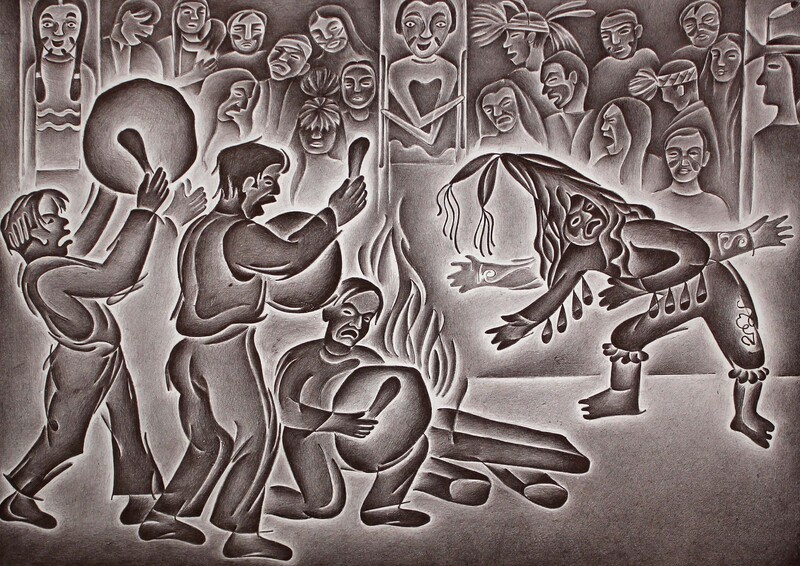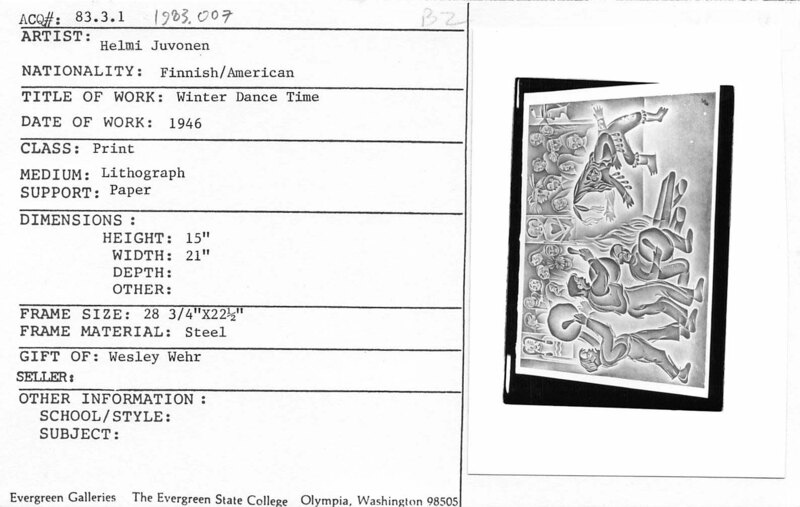-
Title
-
Winter Dance Time
-
Creator
-
Helmi Juvonen
-
Artist ID
-
97
-
Date of Work
-
1946
-
Description
-
Illustration of a Native ceremony, three players on the left before a fire, with a dressed dancer on the right. A crowd watches from the background.
-
Category of Media
-
Print
-
Media
-
Lithograph on paper
-
Accession Number
-
1983.007
-
Location
-
0449a - flat file 3
-
Date Acquired
-
3101983
-
Acquisition Method
-
donation, unrestricted
-
Dimensions of Work
-
14.75" x 21.25"
-
Frame Dimensions
-
(previous) 22.5" x 28.75"
-
Frame Type
-
Steel
-
Donor or Seller
-
Wehr
-
Donor ID
-
2
-
Condition Statement
-
11/2022: Artwork has been directly taped to the mat on all four corners with framer's tape. Otherwise good condition.
-
Artist Bio
-
Helmi Dagmar Juvonen, known in her day simply as Helmi, was a prolific artist whose creativity embraced many media - paintings, drawings, prints, ceramics, and ceramics. She was particularly drawn to the ceremonies and arts of Northwest native culture - masks, dances, costumes, and totemic animals. The artist developed a rapport with particular tribes, including the Lummi, Swinomish, Muckleshoot, Makah, and Yakama, who invited her to participate in their rituals. During the most sacred ceremonies, she relinquished her sketchbook and relied on memory for documentation. Helmi also devoted years to studying and drawing Northwest Coast Indian and South Pacific objects from the Washington State Museum, which became the Burke Museum, University of Washington. In later life, the artist was inspired by the book Primitive Art (1927) by anthropologist Franz Boas.
Source: https://www.whatcommuseum.org/virtual_exhibit/universal_exhibit/vex22/index.htm
-
Abstract
-
Juvonen's largest works from the late 1940s through the 1960s are organized laterally and characterized by shallow indeterminate space and "all-overness". She valued and practiced conventional techniques of three-dimensional illusionism through the 1950s; she also developed a range of strategies much closer to graffiti and cartoons. A light or white delineation on a darker ground, which frequently appears in her works, suggests chalk on a blackboard, and vernacular references in her work are commonly associated with the "white writing" identified with Mark Tobey and Morris Graves. Juvonen introduces into her work words and phrases, a variety of human figures and faces, architectural elements, and religious and eclectic symbols from diverse cultures.
Source: https://en.wikipedia.org/wiki/Helmi_Juvonen



